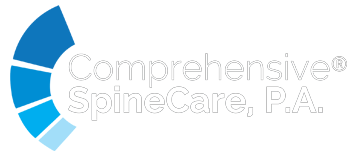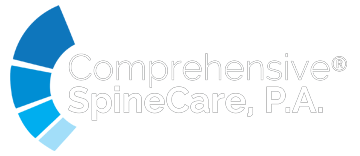In this blog from Comprehensive Spine Care, we go over non-surgical ways to treat a herniated disc.
What Is A Herniated Disc?
A herniated disc is commonly described as a “slipped” or “ruptured” disc. A herniated disc may occur anywhere in your spine but more frequently in the neck, lower back, or chest area regions of the spine. When a disc slips, a portion of the disc moves into the spinal canal, causing pressure on the spinal cord or the spinal nerves.
What Are The Symptoms Of A Herniated Disc?
Signs and symptoms of a herniated disc depend on the location of the ruptured disc and how much the disc is pressing the nerve. Common symptoms include:
- Arm or leg pain. If your herniated disc is located in your lower back, you’ll typically feel pain in your lower back, buttocks, thigh, foot, and calf. For a herniated disc found in your neck, you’ll feel the sharpest pain in your shoulder and arm.
- Numbness or tingling. People who have a herniated disc often experience numbness or tingling in the area affected by nerve compression.
- Decreased muscle strength. Muscles around the herniated disc can weaken. This may cause your mobility range to decrease.
What Factors Increase Your Chances Of A Herniated Disc?
Disk herniation is most commonly a result of slow, aging-related wear and tear of a disc. As people age, the disc thins out and becomes less flexible and more prone to tearing with even a minor movement. Less frequently, a herniated disc is the cause of lifting a heavy object incorrectly causing undue stress in the spine. A herniated disc can also be caused as the result of direct trauma to the spine, such as in car accidents.
Factors that can increase the risk of a herniated disc include:
- Weight. Being overweight can put extra stress on your discs.
- Occupation. People who work physically-strenuous jobs have a greater risk of back problems.
- Genetics. If you have an immediate family member that has a herniated disc, you may be more prone to the condition.
- Smoking. Smoking reduces the oxygen supply to your spine and can cause discs to deteriorate more quickly.
- Constantly sitting. Being seated for hours puts a large amount of pressure on your spine. If you spend hours on the road driving, this combined with the vibration from the motor vehicle engine can put even more pressure on the spine.
How Do You Treat A Herniated Disc Without Surgery?
Most cases of a herniated disc can be resolved with conservative treatment within a couple of days or weeks. This type of treatment mainly focuses on modifying activities to avoid movement that causes pain and taking pain medication. Doctors commonly prescribe:
- Nonprescription pain medications. If your pain is mild to moderate, your doctor might recommend over-the-counter medication.
- Neuropathic drugs. These drugs affect nerve impulses to decrease pain.
- Muscle relaxers. You might be prescribed these if you have muscle spasms.
- Opioids. If other medications don’t relieve your pain, your doctor might consider short-term use of opioids.
- Epidural injections. If oral medications do not help your symptoms, your doctor might recommend that powerful anti-inflammatory medicine be directly introduced into the space outside of the sac of fluid around your spinal cord’s epidural space.
In addition to prescribing medication, your doctor may recommend physical therapy to help with your pain. Physical therapists can demonstrate the correct positions and exercises that will minimize the pain of a herniated disc.
If you have a herniated disc or are suffering from chronic back pain, Comprehensive Spine Care in Westwood, NJ has over 20 years of experience. We offer 4 locations to serve patients throughout the greater New York area. Call 201-634-1811 today or schedule your appointment online.










